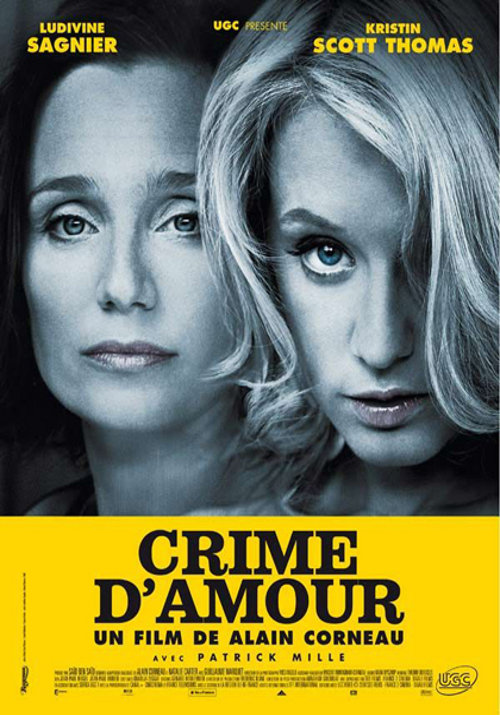

By Mike Wilmington Wilmington@moviecitynews.com
Wilmington on Movies: Love Crime

Love Crime (Three Stars)
France: Alain Corneau, 2010
Movie murder mysteries can sometimes get too tricky and convoluted for their own good, and that’s pretty much what happens in Love Crime (Crime d’Amour), a fine, itelligent, neatly made little French film neo-noir that would have been even better if it didn’t try so hard to outsmart us all.
The final effort from the admirable and crafty French writer-director Alain Corneau, who died at 67, after a notable career, Love Crime begins wonderfully, with a great snarling corporate cat-fight between Kristin Scott Thomas as Christine, a pearly-smooth multinational corporate executive with the silken movies of a chic leopard and the venomous morals of a snake, and Ludivine Sagnier as Isabel Guerin, her naïve and seemingly idolatrous and maybe secretly venomous assistant.
As we watch, amused and appalled, Christine steals her ideas and dignity and corporate standing from Isabelle, nearly seduces her, has her wastrel lover Philippe (Patrick Mille) seduce Isabelle instead, double-crosses her and makes a public fool of her. This is awful behavior, even for Kristin Scott Thomas at her meanest, and she does it with an evil smiling panache that makes you think of Barbara Stanwyck talking French. Sagnier responds with a vengeance.
Also around, but no match for the two women (maybe) are two men who take Christine and Isabelle in interesting directions: the spineless Philippe and Isabelle‘s impeccable, seemingly all-knowing office ally Daniel (Guillaume Marquet).
That’s the Love part of the film. (Love? Well, remember, we’re in corporate land.) Then comes the Crime: an ingenious murder scheme by one of the two — or maybe a bystander, we’ll never tell — which proceeds to unravel and re-knit in a particularly complex way, one which, I‘m sorry to say, kept losing me more and more, the more it unwound.
The plot, which makes one of Dame Agatha Christie’s least-likely suspect mystery classics look positively simple and easy to pull off, seems at first brush, very clever, but makes less and less sense the more you examine it. Tom me, the scheme suggests, say, an amateur magician trying to build a model of the Eiffel Tower with matchsticks, arranged all around a lit candle. As I watched, I kept saying to myself (inaudibly) “You know there are easier ways to do this.” And there are — and some of them may even be as or more entertaining than Love Crime.
What I would have preferred in fact, since this was Corneau/s last film and since it starts so infernally well, and since I would have loved to praise it unreservedly, is for the two warring women to continue their catfight (one of them, of course, has to die, for the film to become a murder mystery, which means we lose one of the movie’s two major assets too early) and battle all the way to the end, with one lady pulling some sneaky wickedness, and the other responding in kind. (Or cruel). A Bette Davis-Joan Crawford sort of blood feud. That might have been a great movie. Instead, it’s a good movie, with a great beginning.
Ludivine Sagnier, an ingénue with tough eyes, has had to deal with devious older women played by first rate actresses before (Charlotte Rampling in Swimming Pool), and, with Sagnier’s wounded, dazey looks and big pale eyes she knows how to win sympathy and fall apart and pull herself together again. As for Kristin Scott Thomas, her Christine — wittily, icily chic and full of mean delight at her own snaky machinations — well, watching her reminded me of how incredibly good (at being bad) she was, what a great preening, selfishly, smilingly destructive villainess, in Charles Sturridge’s underrated adaptation of Evelyn Waugh‘s dark social comedy A Handful of Dust. (By the way, I disagree with the critics who say Thomas is a better actress in French than she is in English. She’s just as good in either, but these days she gets offered better roles in France.)
Alain Corneau has handled film noir before — his Serie Noire is adapted from vintage Jim Thompson (A Hell of a Woman), and he‘s also drawn a bead on crime in Police Python 357, Choice of Arms, and in his last film before Love Crime, Le Deuxieme Souffle, a remake of the 1966 Jean-Pierre Melville–Jose Giovanni–Lino Ventura heist classic.
Corneau‘s best-loved (and best) film though, and one of the most popular of all French movies, is his 1991 Tous Les Matins du Monde, in which Jean-Pierre Marielle and Gerard Depardieu enacted another, gentler feud between the great early French composers Sainte Colombe and Marin Marais, and in which the decor and detail and music (if not the camerawork) were as lush as an Ophuls.
Despite my qualms, Love Crime’s luscious cargo of impeccable décor, fine cinematics, and sheer raving, compellingly bad feminine behavior — spiced by the beauty and cool wiles of both Scott Thomas and Sagnier — makes for a very good French neo-noir, well-fit for those cine-buffs who lust after the better brand of French screen crime and miss the experts — Clouseau, Chabrol, Melville and even at times, Truffaut — who used to bring us the murders, fear and ingenious twists. Here, Corneau said he began his own creative process by dreaming up the movie’s big plot twist, and then building a film around it. It’s shame he didn’t realize that the film he built may have been better than the twist. (French, with English subtitles.) (Chicago: Music Box)














